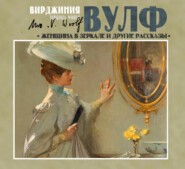По всем вопросам обращайтесь на: info@litportal.ru
(©) 2003-2025.
✖
Night and Day
Автор
Год написания книги
2017
Настройки чтения
Размер шрифта
Высота строк
Поля
“You remember the passage just before the death of the Duchess?” he continued, edging still closer to Denham, and adjusting his elbow and knee in an incredibly angular combination. Here, Katharine, who had been cut off by these maneuvers from all communication with the outer world, rose, and seated herself upon the window-sill, where she was joined by Mary Datchet. The two young women could thus survey the whole party. Denham looked after them, and made as if he were tearing handfuls of grass up by the roots from the carpet. But as it fell in accurately with his conception of life that all one’s desires were bound to be frustrated, he concentrated his mind upon literature, and determined, philosophically, to get what he could out of that.
Katharine was pleasantly excited. A variety of courses was open to her. She knew several people slightly, and at any moment one of them might rise from the floor and come and speak to her; on the other hand, she might select somebody for herself, or she might strike into Rodney’s discourse, to which she was intermittently attentive. She was conscious of Mary’s body beside her, but, at the same time, the consciousness of being both of them women made it unnecessary to speak to her. But Mary, feeling, as she had said, that Katharine was a “personality,” wished so much to speak to her that in a few moments she did.
“They’re exactly like a flock of sheep, aren’t they?” she said, referring to the noise that rose from the scattered bodies beneath her.
Katharine turned and smiled.
“I wonder what they’re making such a noise about?” she said.
“The Elizabethans, I suppose.”
“No, I don’t think it’s got anything to do with the Elizabethans. There! Didn’t you hear them say, ‘Insurance Bill’?”
“I wonder why men always talk about politics?” Mary speculated. “I suppose, if we had votes, we should, too.”
“I dare say we should. And you spend your life in getting us votes, don’t you?”
“I do,” said Mary, stoutly. “From ten to six every day I’m at it.”
Katharine looked at Ralph Denham, who was now pounding his way through the metaphysics of metaphor with Rodney, and was reminded of his talk that Sunday afternoon. She connected him vaguely with Mary.
“I suppose you’re one of the people who think we should all have professions,” she said, rather distantly, as if feeling her way among the phantoms of an unknown world.
“Oh dear no,” said Mary at once.
“Well, I think I do,” Katharine continued, with half a sigh. “You will always be able to say that you’ve done something, whereas, in a crowd like this, I feel rather melancholy.”
“In a crowd? Why in a crowd?” Mary asked, deepening the two lines between her eyes, and hoisting herself nearer to Katharine upon the window-sill.
“Don’t you see how many different things these people care about? And I want to beat them down – I only mean,” she corrected herself, “that I want to assert myself, and it’s difficult, if one hasn’t a profession.”
Mary smiled, thinking that to beat people down was a process that should present no difficulty to Miss Katharine Hilbery. They knew each other so slightly that the beginning of intimacy, which Katharine seemed to initiate by talking about herself, had something solemn in it, and they were silent, as if to decide whether to proceed or not. They tested the ground.
“Ah, but I want to trample upon their prostrate bodies!” Katharine announced, a moment later, with a laugh, as if at the train of thought which had led her to this conclusion.
“One doesn’t necessarily trample upon people’s bodies because one runs an office,” Mary remarked.
“No. Perhaps not,” Katharine replied. The conversation lapsed, and Mary saw Katharine looking out into the room rather moodily with closed lips, the desire to talk about herself or to initiate a friendship having, apparently, left her. Mary was struck by her capacity for being thus easily silent, and occupied with her own thoughts. It was a habit that spoke of loneliness and a mind thinking for itself. When Katharine remained silent Mary was slightly embarrassed.
“Yes, they’re very like sheep,” she repeated, foolishly.
“And yet they are very clever – at least,” Katharine added, “I suppose they have all read Webster.”
“Surely you don’t think that a proof of cleverness? I’ve read Webster, I’ve read Ben Jonson, but I don’t think myself clever – not exactly, at least.”
“I think you must be very clever,” Katharine observed.
“Why? Because I run an office?”
“I wasn’t thinking of that. I was thinking how you live alone in this room, and have parties.”
Mary reflected for a second.
“It means, chiefly, a power of being disagreeable to one’s own family, I think. I have that, perhaps. I didn’t want to live at home, and I told my father. He didn’t like it… But then I have a sister, and you haven’t, have you?”
“No, I haven’t any sisters.”
“You are writing a life of your grandfather?” Mary pursued.
Katharine seemed instantly to be confronted by some familiar thought from which she wished to escape. She replied, “Yes, I am helping my mother,” in such a way that Mary felt herself baffled, and put back again into the position in which she had been at the beginning of their talk. It seemed to her that Katharine possessed a curious power of drawing near and receding, which sent alternate emotions through her far more quickly than was usual, and kept her in a condition of curious alertness. Desiring to classify her, Mary bethought her of the convenient term “egoist.”
“She’s an egoist,” she said to herself, and stored that word up to give to Ralph one day when, as it would certainly fall out, they were discussing Miss Hilbery.
“Heavens, what a mess there’ll be to-morrow morning!” Katharine exclaimed. “I hope you don’t sleep in this room, Miss Datchet?”
Mary laughed.
“What are you laughing at?” Katharine demanded.
“I won’t tell you.”
“Let me guess. You were laughing because you thought I’d changed the conversation?”
“No.”
“Because you think – ” She paused.
“If you want to know, I was laughing at the way you said Miss Datchet.”
“Mary, then. Mary, Mary, Mary.”
So saying, Katharine drew back the curtain in order, perhaps, to conceal the momentary flush of pleasure which is caused by coming perceptibly nearer to another person.
“Mary Datchet,” said Mary. “It’s not such an imposing name as Katharine Hilbery, I’m afraid.”
They both looked out of the window, first up at the hard silver moon, stationary among a hurry of little grey-blue clouds, and then down upon the roofs of London, with all their upright chimneys, and then below them at the empty moonlit pavement of the street, upon which the joint of each paving-stone was clearly marked out. Mary then saw Katharine raise her eyes again to the moon, with a contemplative look in them, as though she were setting that moon against the moon of other nights, held in memory. Some one in the room behind them made a joke about star-gazing, which destroyed their pleasure in it, and they looked back into the room again.
Ralph had been watching for this moment, and he instantly produced his sentence.
“I wonder, Miss Hilbery, whether you remembered to get that picture glazed?” His voice showed that the question was one that had been prepared.
“Oh, you idiot!” Mary exclaimed, very nearly aloud, with a sense that Ralph had said something very stupid. So, after three lessons in Latin grammar, one might correct a fellow student, whose knowledge did not embrace the ablative of “mensa.”
“Picture – what picture?” Katharine asked. “Oh, at home, you mean – that Sunday afternoon. Was it the day Mr. Fortescue came? Yes, I think I remembered it.”
The three of them stood for a moment awkwardly silent, and then Mary left them in order to see that the great pitcher of coffee was properly handled, for beneath all her education she preserved the anxieties of one who owns china.
Ralph could think of nothing further to say; but could one have stripped off his mask of flesh, one would have seen that his will-power was rigidly set upon a single object – that Miss Hilbery should obey him. He wished her to stay there until, by some measures not yet apparent to him, he had conquered her interest. These states of mind transmit themselves very often without the use of language, and it was evident to Katharine that this young man had fixed his mind upon her. She instantly recalled her first impressions of him, and saw herself again proffering family relics. She reverted to the state of mind in which he had left her that Sunday afternoon. She supposed that he judged her very severely. She argued naturally that, if this were the case, the burden of the conversation should rest with him. But she submitted so far as to stand perfectly still, her eyes upon the opposite wall, and her lips very nearly closed, though the desire to laugh stirred them slightly.

















